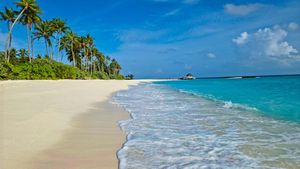On the shores of Cape Cod, Massachusetts, the discovery of a giant great white shark has sparked both intrigue and mourning among local researchers and authorities. Named Koala, this twelve-and-a-half-foot apex predator was found washed ashore on Nauset Beach, leaving many questions about its untimely demise.
The Orleans Police Department and local officials were alerted to the situation when beach patrol discovered the shark on Tuesday morning. This led to the involvement of Nauset Recovery Inc., under the direction of Dennis Reed, who was tasked with removing the shark's substantial carcass from the beach. Weighing approximately 1,240 pounds, Koala was towed away for examination.
Though Koala was identifiable—a recognized entity among researchers since at least 2022—his cause of death remains shrouded in mystery. A necropsy conducted by Greg Skomal, lead scientist from the Massachusetts Division of Marine Fisheries, brought no clarity, as preliminary results suggested no definitive signs of trauma.
“There were no bite marks or anything on it,” Reed noted, expressing concern over the shark’s condition. Observing blood around its mouth, Reed speculated the shark may have suffered from significant internal bleeding. There was also no indication of finning, the practice of removing shark fins before discarding the body, which often leads to their slow death; all of Koala’s fins remained intact.
The investigation team has expressed the necessity for additional tests to determine the cause of death. Skomal mentioned potential leads, including the possibility of chronic infections, beaching, or suffocation. “Sometimes, sharks can become confused and end up beaching themselves when they’re swimming shallow waters,” Skomal explained, alluding to how changes in tides and shifting sandbars can disorient these marine creatures.
Interestingly, Koala was not the only shark to turn up dead on the beaches this week. Another local resident, Bob Amaral, documented the finding of a porbeagle shark on Chapin Beach, whose remains appeared to have suffered the ravages of scavengers, preventing any clear conclusions about its death.
The timing of these eerie discoveries coincides with what is typically the height of shark activity along Cape Cod, which has seen increased populations of great white sharks over the last decade due to conservation efforts. The Atlantic White Shark Conservancy reports there were nearly 800 individual sharks spotted in the area from 2015 to 2018 alone.
The disappearance of Koala highlights the growing tensions and curiosity surrounding the white shark population off Cape Cod, where researchers now view the area as one of the densest seasonal concentrations of these magnificent creatures worldwide. Greg Skomal related this surge back to protective measures taken for gray seals, the primary prey for white sharks, which have rebounded significantly since gaining federal protections under the Marine Mammal Protection Act.
“The rebounding populations of both seals and sharks can be seen as conservation success stories,” Skomal elaborated. “Given the past declines of these species due to fishing pressures, the recent increases are promising.”
For almost eleven years, the Atlantic White Shark Conservancy has actively participated in researching and conserving these sharks, culminating in the development of the Sharktivity app, which tracks their presence along the Massachusetts coastline. It’s clear the scientific community is now focused on tapping every possible source of information concerning sharks like Koala.
Despite its unfortunate end, the contributions Koala can provide through necropsy and pathology testing may significantly enrich our knowledge about the great white sharks' biology and ecology. John Chisholm, among the shark researchers, emphasized the educational value of such events, stating, “While it’s sad, the knowledge we gain will help future research efforts.”
Images of the scene have since circulated widely on social media, with the Orleans Police Department humorously remarking on the unusual nature of their call. “You really never know what kind of call you'll respond to on any shift,” the department noted on their Facebook post, highlighting the unusual scenario of towing away such a large and iconic predator.
Koala's death has become more than just another anecdote about marine life; it embodies the delicate balance between conservation and the mysteries of nature. It invites reflection on the impact of human practices on marine ecosystems and the connectedness of life beneath the waves. The community and researchers await more information about the specifics of Koala’s situation, hoping it aids their relentless pursuit of knowledge about the great white shark populations on Cape Cod.



